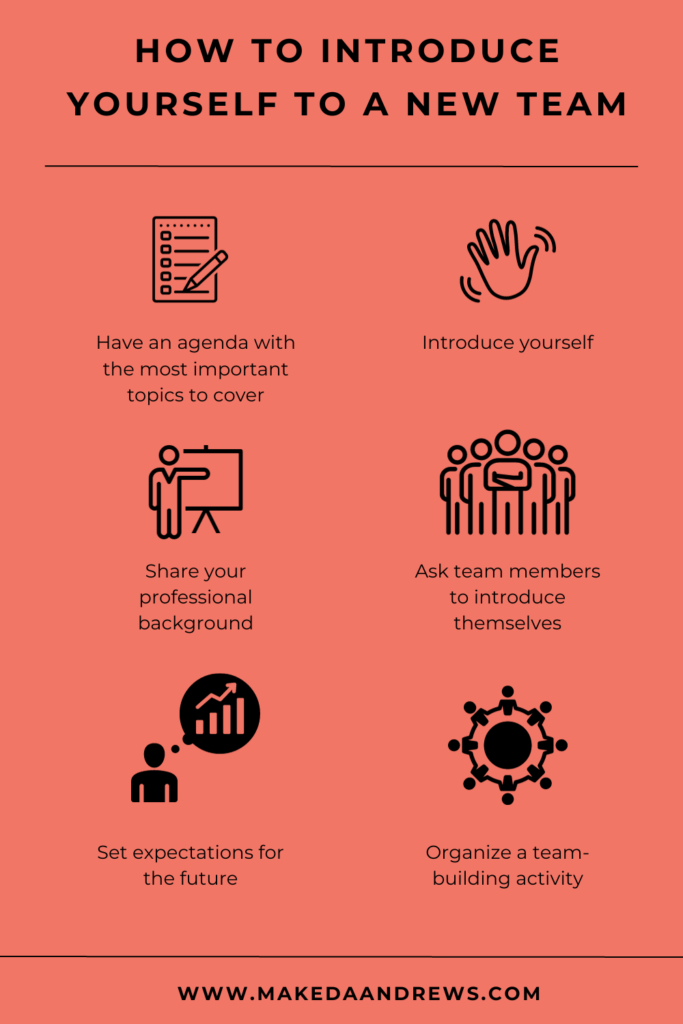How to Introduce Yourself to a New Team
Hi, I'm Mak. I'm a leadership coach for new managers who knows what it's like to be filled with overwhelm, self-doubt and terror that I’d let everyone down. My Story
FREE MICROCAST
How to Become an Effective Leader so You Can Build a High Performance Team
Learn how to delegate with confidence, navigate those tricky conversations (even for introverts!), and finally stop relying on Google to do your job.
Netflix < MakTV
THE YOUTUBE CHANNEL
No but really. This is the kinda content that’s actually healthy to binge. In fact, you become more of an awesomesauce manager with every video you watch.
There’s a common quote from Nas, a popular artist and songwriter, that reads, “You only have one first chance to make one first impression that lasts a lifetime.” Talk about feeling pressured – especially as a first-time manager entering the grounds of meeting their new peeps for the first time. That’s why, in this blog post, I’ll walk you through how to introduce yourself to a new team. Whether you’re new to the company or just have been promoted to the role, stick to the end to learn how to make a killer first impression!
How to Introduce Yourself to a New Team.
One of the things I like to say to my NMA students is that when you become a team leader, you should expect people to watch everything you do and say. But also remember that you were chosen for this role for a reason, and you are the perfect choice to lead this team. That constant reinforcement will give you the confidence to approach your peeps clearly and honestly from the first time. And one of the first opportunities you’ll get is an Introductory Meeting.
An introduction meeting aims to discuss in broad strokes what team members can expect from you over the next couple of weeks. At this meeting, you’ll be able to show your enthusiasm for your new position, engage with your new team members, and pave the way for a smooth transition.
Before diving in, make sure you have an agenda on hand with all the points to discuss during this meeting to get the most out of it and lead the discussion effectively.
It’s important to mention that the points in your agenda will look different depending on whether you are a new manager coming into an already established team or moving from peer to manager, so choose the one that applies to you. But don’t worry, we’ll cover each of these points to prepare effectively and tackle this meeting!
Introducing Yourself When You’re Brand New to the Team.
Starting a new manager position in a new company is like that first day of school; everything is new and exciting, so make sure you reflect this feeling by preparing yourself with the following topics in your meeting agenda:
Introduce Yourself and Your Background:
Create a personal connection with your team by sharing a bit of yourself and how this shaped you for your professional role. Sharing your personal background reminds people that there is a human behind the title.
Professional Background:
Share your professional journey and career milestones to help your people understand your experience and what you’ll bring to the team. Note: Be careful not to brag. Any highlights or career milestones should be framed in a way that team members understand how your skillsets and experience will help them to be successful.
Team Member Introductions:
Ask your team members to introduce themselves. Remember that they already know each other, it’s you that is the newbie. So make the introductions unique and enjoyable for them. For example, ask each one to share one thing about themselves that the team doesn’t already know. That way they aren’t sitting through introductions thinking – I already know this individual, what’s the purpose of this?
Expectations for the Future:
Now, let’s get into business! In general, setting expectations with employees is an essential part of your new role, so in this introductory meeting, you want to provide an overview of your expectations in terms of:
- 1:1 Meetings: Present your plan for having regular one-on-one sessions with each team member and reinforce the importance of these meetings for open communication and feedback.
- Shadow Sessions: Discuss your plans for shadowing team members to better understand their roles and responsibilities.
- Team Meetings: Show your team what to expect regarding team meetings, their participation or role, and the follow-up you wish on their end.
Discuss Near-Term Expectations:
Presenting a brief but clear picture of what to expect from your team is an essential point on your introductory meeting agenda. Try to keep this light because you’ll get plenty of opportunities to go in-depth when you meet with each person.
Communication Preferences:
Be clear to share what you expect from your peeps regarding communication, and highlight your style and preferences to avoid future misunderstandings or mixups. For example, if you want them to keep an open mind through the transition or provide honest, candid feedback as you do the 1-1s or shadow sessions.
Team-Building Activity (Optional):
I highly recommend to start with a team-building activity to get to know each team member and promote a positive work environment.
Here’s an example of how you can start up this meeting:
Hello, everyone. My name is (your name) and I’m so excited to be able to take on this role of (position) so that I can support you within your various roles. I’m originally from ⦗your town⦘, and my background is ⦗describe your expertise field and background⦘. A principle that I hold firm to the importance of clear and open communication. Now because I strongly believe in communication being a fundamental to success I want to make it clear that from this moment forward your thoughts, ideas and concerns are important to me and I encourage you to share with me any and all of the above whenever you feel called to do so. In the coming weeks, I look forward to getting to know each of you better and understanding your roles within the team. So here’s a preview of what you can expect…
What other topics would you consider when you introduce yourself to a team? Comment below!

Introducing Yourself When You Were Part of the Team.
Being promoted within the same company has many benefits. For example, you know the customer, you know the team and you understand the company culture. However it is no doubt one of the hardest transitions because you now have to lead and direct your former teammates. That being said, if you’re in this position, check out this video before moving forward.
To show confidence and make the most out of this introductory meeting, include the following topics in your agenda:
Thank the Team for Their Support:
Acknowledge and be grateful to your team for their support during your transition. Try to highlight how each one is important in the team to make this change a smooth one.
Reaffirm the Purpose of Change:
Reassure your team that things will not be changing immediately or just for the sake of change but that any changes made will be intentional, and you all go through it together.
Logistics of the Transition:
Discuss any logistical aspects, like process changes, reporting, or team dynamics, and open the floor to questions and concerns your team may have.
Expectations for the Future:
Communicate your expectations about:
- 1:1 Meetings: Provide your approach to one-on-one meetings and how they will differ from before.
- Shadow Sessions: Since you already know the team, you can choose how and when to have shadowing sessions.
- Team Meetings or Huddles: Be open to sharing your perspective and vision for your team meetings and what they can expect from you as a leader.
Near-Term Expectations:
In a broad way, share your expectations for team members during this transition and try to promote open communication, feedback, and suggestions to improve the team’s dynamic.
Communication Preferences:
Introduce your communication style and preferences clearly so your team members can adapt quicker and more effectively.
Team-Building Activity (Optional):
Diffuse any possible tension and promote a healthy work environment with a team-building activity. Since you already might know some of your team members, finding an activity that resonates with them the most might be easier and allow you to get to know them better.
Let’s take a look at how your start to this meeting should go:
Hi, everyone. Thanks so much for taking the time to meet today. I wanted to follow up and provide space for questions after the recent team change within our department. Now, while yes, my role is changing, the one thing that will not change is my commitment to this team and my resolve to ensure we’re all successful is even more so important to me. I want to thank each of you for your encouragement and support throughout this transition and I am so excited about where we go from here. Before I dive into the preview of what’s upcoming, does anyone have any questions or concerns you’d like to surface?
What do you think about this statement? If you’ve recently been promoted to manager, I’m interested in your opinions, so comment below!

So there you have it, a complete guide on introducing yourself to a new team! Make sure to follow these steps to ensure a great first impression, but most importantly, to foster a connection and promote opportunities to ease the transition by showing your support along the way.
Don’t forget to get my FREE guide to becoming an effective team leader and share this article with another colleague who might need this information!
If you’re looking to uplevel in your leadership capacity, then check out our signature program, The New Manager Accelerator. NMA is our comprehensive step-by-step curriculum designed to help you develop the confidence and skills you need to become an effective and respected leader.

October 11, 2023